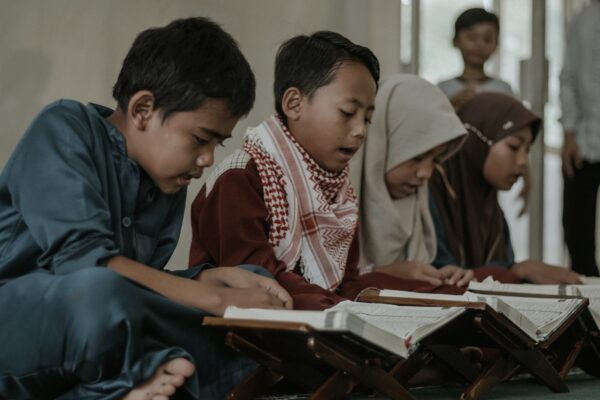In a country that prides itself in its multiculturalism, what does the future of Islamic education look like in Malaysia?
In a country that prides itself in its multiculturalism, what does the future of Islamic education look like in Malaysia?
When the Malaysian Prime Minister, Anwar Ibrahim, suggested the implementation of Imam An-Nawawi’s 40 Hadith module at public schools for young students, it sparked mixed reactions among Malaysians. Some even said it’s a way of forcing Islamic teaching among the younger generations.
Due to Malaysia’s multi-racial population, the notable aspect of being a Malaysian is the freedom to practice any religion and speak any recognised language publicly in peace among a diverse nation.
Since Tun Dr. Mahathir Mohamed, the fourth prime minister, declared Malaysia as an Islamic state despite facing challenges from the opposition political party back in 2001, Muslims in Malaysia have been blessed with jurisdiction and social practices that abide by Islamic laws. Is Islam a compulsory practice for all Malaysians? No, but all of us live by it naturally without any forceful approach.
It’s much easier to introduce Islam through cultural practices, especially at schools, a fundamental place where students can learn certain principles, and grow and shape their mindsets through the environment of school that they choose to observe and adapt to. In Malaysia, there are national and religious schools, where students can learn Islam, in the national language of Bahasa Malaysia and intensively in Arabic respectively.
There are also vernacular public schools such as Chinese and Tamil schools, which focus on Mandarin Chinese and Tamil respectively. For example, if a student attends a Chinese school, they will learn all modules in Chinese. Since Islam is an official religion in Malaysia, some Chinese schools do offer Islamic Studies to Muslim students. Similar to other countries, plenty of private and semi-private schools are also available across the country. Most Muslim Malaysians have been learning how to practice Islam in aspects of tauhid, ibadah, fiqh, and akhlaq since kindergarten.
In August 2023, some Malaysians were deeply concerned with Anwar Ibrahim’s hadith module implementation idea into the education syllabus. They thought all Malaysian schools were required to implement this module. Some parents also believed that it would burden the students.
In the end, the Ministry of Education has officially announced that it will just be obligatory for the students in national Islamic schools and partially government-funded Islamic schools. Anwar Ibrahim mentioned that younger Muslims are easily influenced by un-Islamic lifestyles these days via technology. To prevent Muslim society from normalizing any sort of religious manipulation, the hadith module is one of the ways to help strengthen the basic Islamic understanding and preserve Islamic teachings among young minds.
As a former national school student, I would say that all this while, Islamic Studies has been just a module that some Muslim Malaysian students would want to pass so that they could progress to the next education level. We did learn about several hadiths and memorized a few Quranic verses to fulfill the passing requirement. Most of the time, some of us would forget what we have studied back in primary and secondary schools since the module isn’t included in our course of choice in some higher institutions.
However, some Muslim students do make use of the Islamic knowledge they have learned in school. For example, they recite the memorized Quranic verses in the fardh prayers. As Muslims whose Arabic isn’t the native language, this memorization practice that has been established at public schools for several years is a part of the effort to understand the Islamic faith that we merely inherited through generations. We may forget the verse if it’s not practised ritually, but once we understand the meaning through translations and find it relatable, we’d definitely be able to recite it over time.
A similar practice would go to the new implementation of the hadith module. It will show how Islam can be practiced correctly, referring to another legal source instead of the Quran alone, since the hadith also covers topics such as spirituality, lifestyle, family, food, marriages, money, war, etc. Plus, these 40 hadiths are the authentic Islamic teachings by our Prophet Muhammad (peace be upon him) himself.
According to Anwar Ibrahim, younger generations should learn these basic authentic 40 hadiths to prepare them as ideal Muslims in the future as well as to protect them from slanderers and immoralities.
I have left national schools for almost 20 years and recalled that there were only less than ten hadiths we learned in our Islamic Studies syllabus. One of them is about ‘Niat’, the intention of doing something. It’s a special one since it’s the first recorded hadith and as the reflection of the hadith, our former Islamic Studies teachers always reminded us to learn things by heart in order to receive and give out values in more blessed ways. Hence, this first hadith is one of the most important principles that I stick with wherever I go now.
I also remembered my time as a student at a public primary school. Before we began with each lesson, the teachers would ask us to recite these du’a loudly:
اَللَّهُمَّ ﭐفْتَحْ عَلَيْنَا حِكْمَتَكَ وَﭐنْشُرْ عَلَيْنَا مِنْ خَزَائِنِ رَحْمَتِكَ يَآ أَرْحَمَ الرَّاحِمِيْنَ
Oh God, open upon us Your wisdom and pour upon us the treasures of Your mercy, O Most Gracious and Most Merciful.
Although there were four non-Muslims in our class, that didn’t make the situation awkward for them. They stood and listened to our recitation quietly to its completion and lessons went as usual afterwards. The only time they don’t ‘recite’ with us is during Islamic Studies, as they have Moral Studies instead. It had come to my knowledge that some of them memorized the du’a, too. Imagine if the hadith module was implemented into the national school syllabus and learned by the Muslim students in normal public schools – I believe that the non-Muslim students would also receive the positive impacts.
To me, this hadith module implementation into our national Islamic school’s syllabus is a small step that would eventually be a huge advantage for younger Muslims to get to know their inherited religion further and develop their critical thinking skills in this challenging era. This move will also enable them to explain the concept of Islam through various niches with evidence to their non-Muslim friends.
In Malaysia, it’s common to see multiracial generations at one table or on social media platforms discussing histories, faith, and spirituality as well as social issues since the curiosity to learn about others remains undone. And nothing would ever go wrong as long as Muslims share their knowledge based on authentic Hadiths and the Quran since they are both uncorrupted evidence.
Sources
Tan, B. (2023) Anwar: Hadith appreciation module to empower Muslim youth to resist religious manipulation, Malay Mail. Available at: https://www.malaymail.com/news/malaysia/2023/08/25/anwar-hadith-appreciation-module-to-empower-muslim-youth-to-resist-religious-manipulation/87247 (Accessed: 26 August 2023).
The forty hadith of imam nawawi (no date) Nawawi. Available at: https://40hadithnawawi.com/ (Accessed: 11 October 2023).
P. Rajanthiran, R. S., & Mohd Sani, M. A. (2010). DAP’s opposition of Malaysia as an Islamic State. Institute of Tun Dr. Mahathir Mohamad’s Thoughts, Universiti Utara Malaysia.
DOA-Doa Ketika Menuntut Ilmu (no date) UTM ISLAMIC CENTER. Available at: https://chancellery.utm.my/islamic-center-kl/kata-kata-hikmah/doa-doa-ketika-menuntut (Accessed: 25 September 2023).





